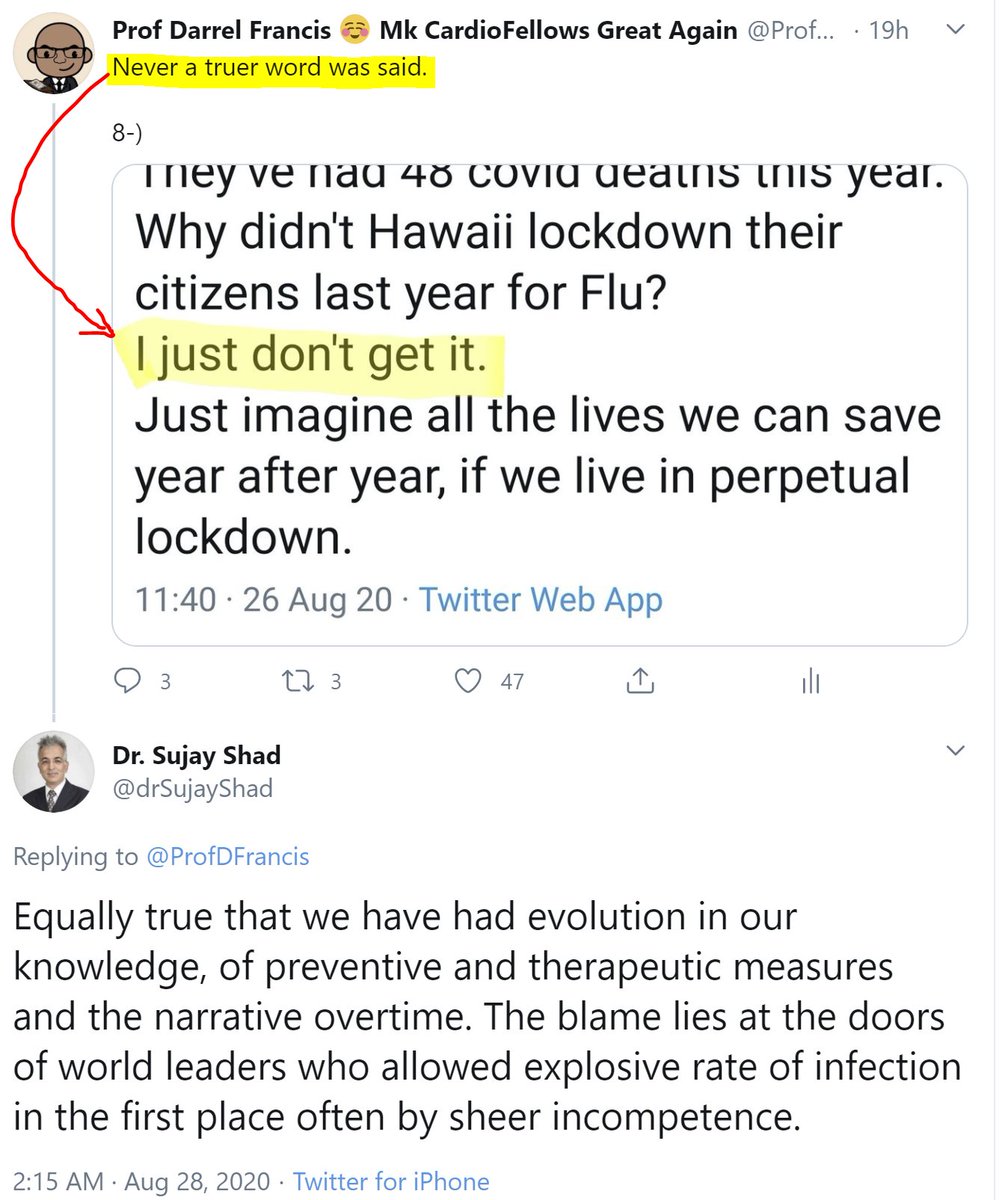Sujay& #39;s comment made me think...
It made me realise the impossible situation that Governments are in.
1. Nobody knew exactly how the Coronavirus would pan out.
2. Nobody knew exactly what preventative steps would work.
3. Countries were not geared up to respond, because we are focussed on other things.
1. Nobody knew exactly how the Coronavirus would pan out.
2. Nobody knew exactly what preventative steps would work.
3. Countries were not geared up to respond, because we are focussed on other things.
But those are the small problems. Here is the big one, highlighted by the two tweets in juxtaposition.
Sujay and I are used to dealing with people used to discussing things rationally and habitually having to make good decisions under uncertainty.
Sujay and I are used to dealing with people used to discussing things rationally and habitually having to make good decisions under uncertainty.
"Let& #39;s give this patient treatment A, for presumed diagnosis X"
"But what if they also have diagnosis Y, for which A will cause problem Z?"
"OK we can treat X with treatment B, but it is less good in the following ways."
"But what if they also have diagnosis Y, for which A will cause problem Z?"
"OK we can treat X with treatment B, but it is less good in the following ways."
Then follows discussion on the likelihoods of X and Y, effectiveness of A and B, and risks of Z. All these letters may be in different medical specialties& #39; parts of the body, so this could be an elaborate discussion.
In the end doctors settle on a course of action.
In the end doctors settle on a course of action.
All the doctors are focussing on their own organ, but realise that there are other organs, and that sometimes the overall-agreed solution may involve harming "their" organ for the patient& #39;s overall benefit, EVEN THOUGH the diagnoses are unknown so the harm may be "unnecessary".
We are used to balancing pro& #39;s and con& #39;s when information we would like to have is in practice unknowable (e.g. "Does this patient have any TB in them *anywhere*, that could reactivate when we immunosuppress? How likely is that to happen?")
So to Sujay and me, if someone said there was a pandemic coming, and he thought it would really come, and I thought it wouldn& #39;t, we wouldn& #39;t fight. We would discuss a bit to and fro, and probably agree that we disagreed, BUT that we should take a series of stepped actions.
We would agree to be inconvenienced and even financially impaired, even with no CERTAINTY of a serious epidemic, and no CERTAINTY that our efforts. would have any effect.
On that basis it seems incompetent of the government to have not done so.
But that is the problem:
On that basis it seems incompetent of the government to have not done so.
But that is the problem:
Not only do governments face problems 1, 2 and 3 above, but also:
4. The PEOPLE that the governments have to instruct mainly DO NOT understand problems 1, 2 and 3, and DO NOT agree to take concerted action with large amounts of information missing.
4. The PEOPLE that the governments have to instruct mainly DO NOT understand problems 1, 2 and 3, and DO NOT agree to take concerted action with large amounts of information missing.
Governments are responsible for organising millions of people. In each million people, think how many angry people who "do not get it" there are for each action the government takes?
1%? That& #39;s 10,000.
Per million population.
1%? That& #39;s 10,000.
Per million population.
Right in the middle of the pandemic, a Twitter user writes out clearly something they find infuriatingly puzzling.
They are literate - the tweet is well written.
They are numerate - it contains a rational comparison of numbers.
And yet they say they don& #39;t understand.
They are literate - the tweet is well written.
They are numerate - it contains a rational comparison of numbers.
And yet they say they don& #39;t understand.
For each of them, there are many, many people who:
CANNOT express themselves so clearly _or_
CANNOT follow numbers as well _or_
do NOT go on twitter.
That& #39;s a lot of people that the government will infuriate by any preventative action.
CANNOT express themselves so clearly _or_
CANNOT follow numbers as well _or_
do NOT go on twitter.
That& #39;s a lot of people that the government will infuriate by any preventative action.
In that situation,
facing riots of furious people objecting to
preventative measures
whose need and efficacy
is inevitably unclear,
getting approval from doctors and scientists etc
is of little solace for the government.
facing riots of furious people objecting to
preventative measures
whose need and efficacy
is inevitably unclear,
getting approval from doctors and scientists etc
is of little solace for the government.
The more I think about it, the more I see why governments consistently under-reacted.
In both senses of the word "government", the individuals and the management style,
we get the government that we deserve.
8-(
In both senses of the word "government", the individuals and the management style,
we get the government that we deserve.
8-(

 Read on Twitter
Read on Twitter


